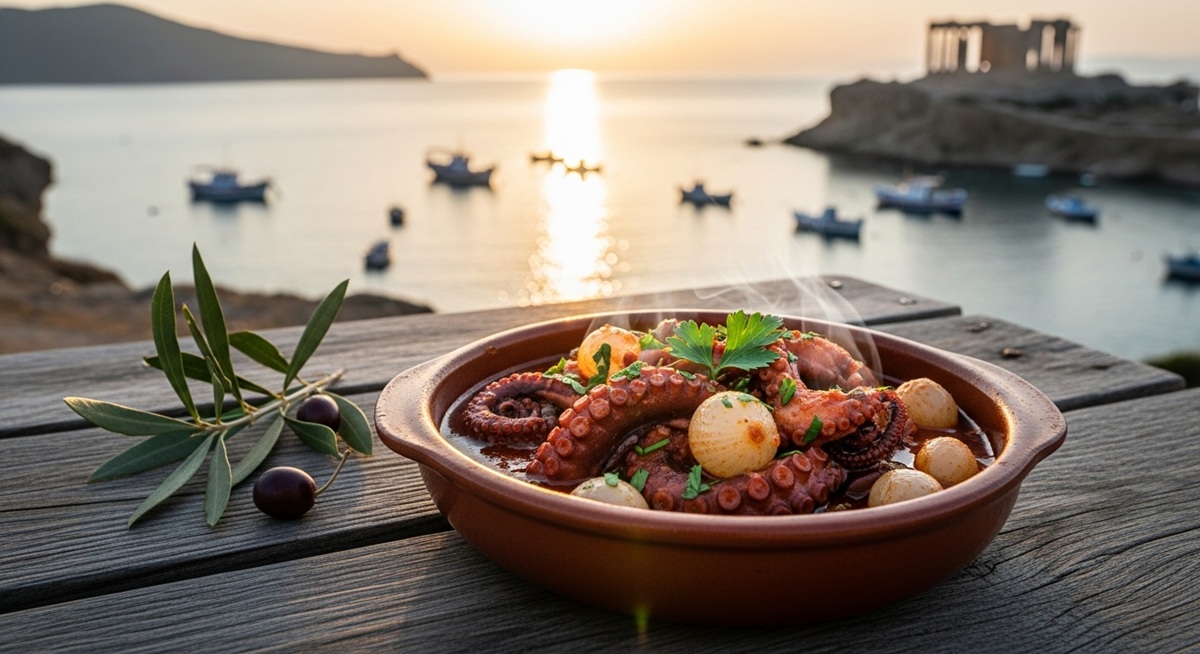Greece is a land where myth, sea, and flavor intertwine. Few dishes capture this more vividly than octopus stifado—a rich, slow-cooked stew of octopus, onions, tomatoes, red wine, and herbs that tastes like the Aegean Sea itself. For centuries, this recipe has connected fishermen, sailors, and families with the ancient gods who ruled the seas.
But octopus stifado is also a story of survival, ritual, and devotion—a dish that carries echoes of Poseidon’s trident, Dionysian feasts, and the salt-soaked winds of Cycladic islands. To eat it is to taste both history and myth. As travelers wander the sun-drenched shores of Greece, seeking out authentic experiences, octopus stifado emerges as a gateway to understanding the country’s soul. It’s a culinary bridge between the mythical past and the vibrant present, where every bite whispers tales of gods and heroes amid breathtaking landscapes.
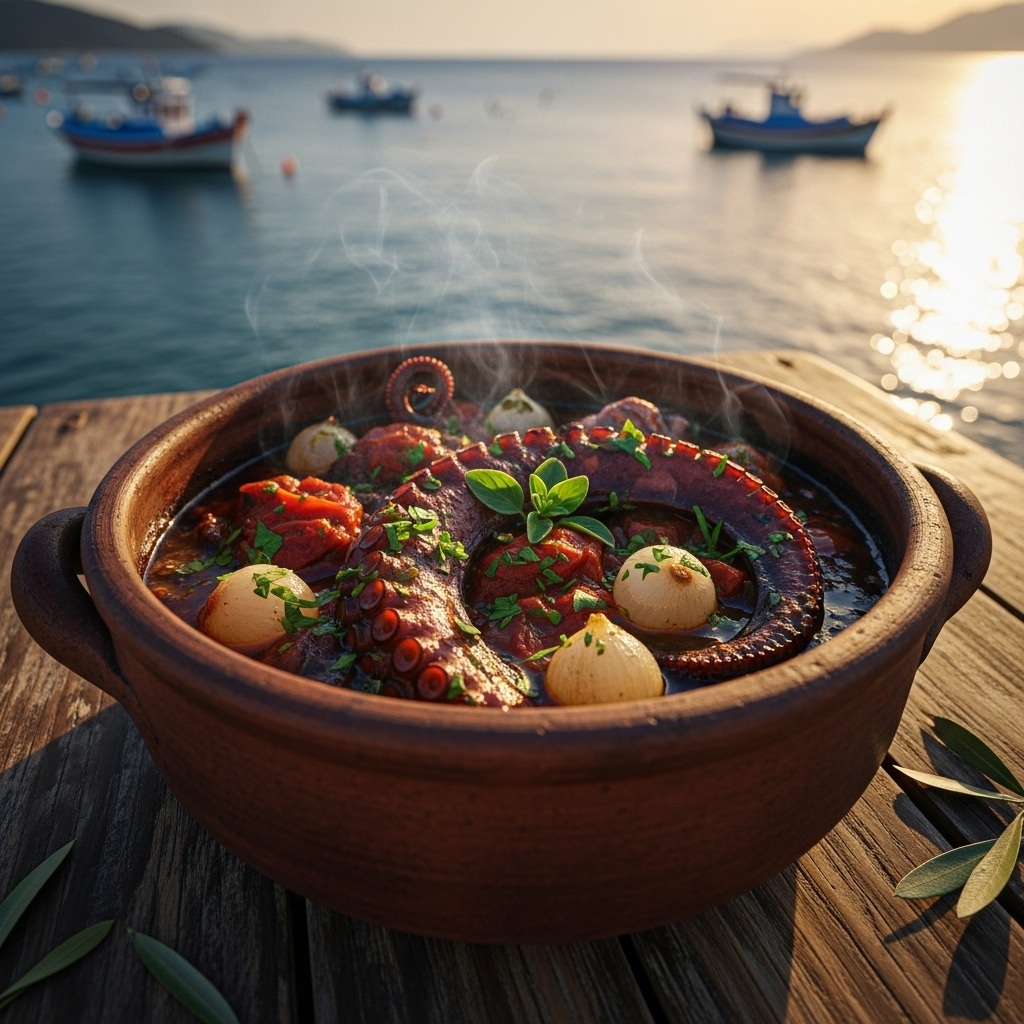
The Mythological Roots of Octopus in Greece
In ancient Greece, the octopus was a creature of profound mystery and symbolism. The Minoans, one of the earliest civilizations in the region, painted it across amphorae and frescoes, symbolizing the boundless energy of the sea. These artworks, dating back to around 1500 BCE, often depicted the octopus with swirling tentacles that mirrored the unpredictable waves, embodying the raw power of the ocean. In Homer’s Odyssey, sea creatures like the octopus represented both danger and sustenance, reflecting Poseidon’s unpredictable nature as the god of the seas, earthquakes, and horses.
The octopus, with its many arms and ability to camouflage, was also linked to Metis, the goddess of cunning wisdom, who could slip away and transform at will. Metis, mother of Athena, personified adaptability—qualities mirrored in the octopus’s real-life behaviors. Eating octopus wasn’t merely about nourishment; it was about absorbing these traits of resilience and cleverness, essential for sailors and islanders living at the mercy of the Aegean Sea. Legends spoke of sea monsters like Scylla, sometimes imagined with octopus-like features, guarding treacherous waters and devouring unwary voyagers. This mythical aura made the octopus a staple in rituals honoring Poseidon, where offerings of seafood were made to appease the god and ensure safe passage.

Beyond Poseidon, the octopus ties into broader Greek mythology. Dionysus, the god of wine and ecstasy, often featured in feasts where sea bounty met earthly delights. Imagine ancient banquets on Crete’s shores, where grilled or stewed octopus was paired with wine from Dionysus’s vines, celebrating life’s cycles. Even Demeter, goddess of agriculture, connects through the fertile lands providing the onions and herbs in octopus stifado. This interplay of gods underscores how Greeks viewed food as sacred, a harmony of elements from sea, land, and vine.
Today, these myths live on in Greece’s coastal villages. Visiting sites like the Palace of Knossos on Crete, with its Minoan frescoes, you can almost feel the octopus’s symbolic presence, urging you to seek out a local taverna for a taste of octopus stifado that echoes those ancient stories.
Octopus in Ancient Art and Lore
Delving deeper, the octopus’s role in Minoan art is particularly fascinating. The famous “Octopus Vase” from the Late Minoan period showcases the creature’s tentacles enveloping the pottery, symbolizing the sea’s embrace and the civilization’s maritime prowess. Researchers believe this motif represented regeneration and the eternal cycle of life, much like the octopus’s ability to regrow limbs. In Greek lore, the polypus (an ancient term for octopus) was feared yet revered; Aristotle described its intelligence, noting how it used tools and changed colors to evade predators.
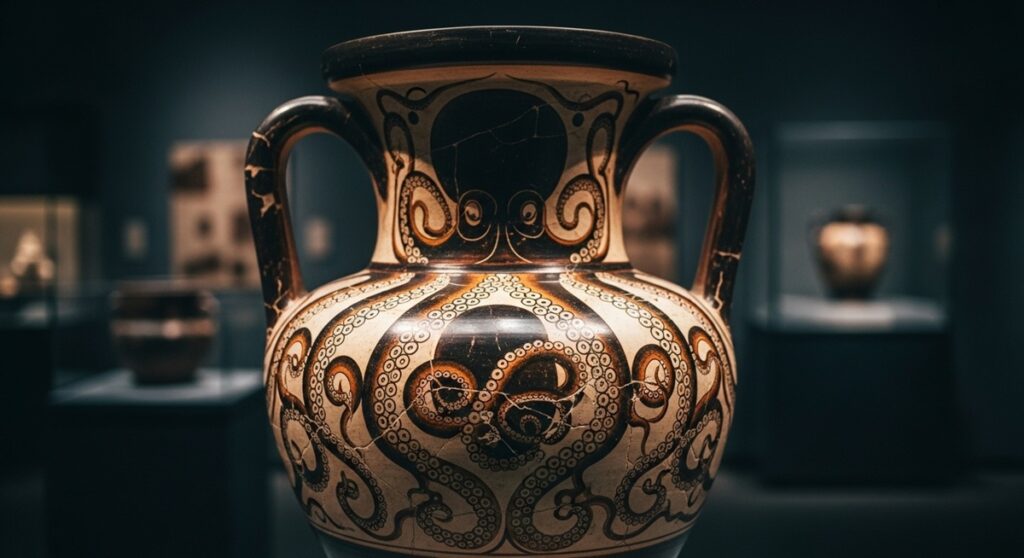
Myths like the Kraken, though more Norse, have Greek parallels in tales of giant sea beasts sent by Poseidon to punish mortals. One story from Lesbos tells of a massive octopus demanding human sacrifices, only to be appeased by heroic deeds. These narratives highlight the octopus as a bridge between the mortal world and the divine, making octopus stifado not just a dish, but a ritualistic nod to these legends.
The Birth of Stifado: From Ancient Stews to Aegean Flavor
The word “stifado” derives from the Venetian “stufado,” meaning “stew,” introduced during the Middle Ages when Venetian traders controlled parts of Greece. This influence, starting in the 13th century after the fall of Constantinople, blended Italian slow-cooking techniques with pure Aegean ingredients: fresh octopus, wild herbs, sweet onions, and island wine.
Ancient Greeks had their own stews, like those mentioned in Apicius’s Roman cookbook, but stifado evolved uniquely in Greece. Over centuries, octopus stifado became the signature dish of seafarers and islanders, uniting the sea’s bounty with the hearth’s warmth. Traditionally, fishermen hung octopus to dry on wooden beams under the sun, tenderizing it before simmering with onions and wine until flavors fused.
This evolution reflects Greece’s history of conquest and resilience. Ottoman influences added spices, while Byzantine roots tied it to earlier rituals. By the time of independence, octopus stifado was a staple, symbolizing communal bonds in times of hardship.
Venetian Legacy in Greek Cuisine
The Venetians, ruling from 1386 in places like Corfu, brought not just stewing methods but also ingredients like vinegar for tanginess. In Crete and the Ionian islands, this fusion created variations still enjoyed today. Think of it as a culinary conquest, where foreign techniques enhanced local flavors, much like how myths adapted over time.
The Anatomy of the Dish: Ingredients with Symbolism
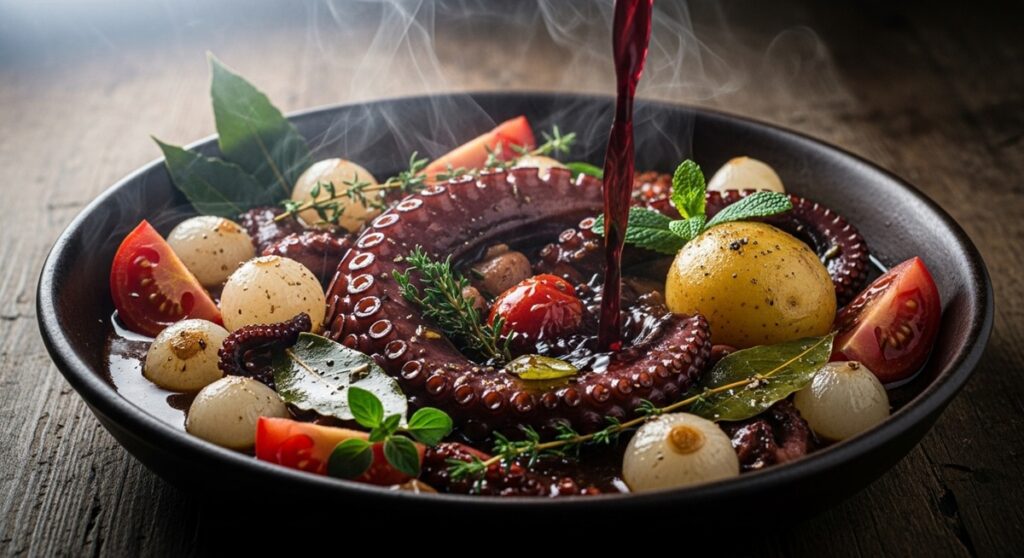
Every ingredient in octopus stifado carries mythical symbolism:
- Octopus – Representing Poseidon’s realm and the mysterious depths of the Aegean Sea.
- Onions – Associated with ritual purification in ancient times; in stifado, they sweeten the sea’s salt, echoing Demeter’s earthly gifts.
- Red wine – The gift of Dionysus, uniting land and sea in celebratory harmony.
- Tomatoes & herbs – Reminders of Greece’s fertile valleys, offerings to Demeter, goddess of agriculture.
Together, they create a dish that’s a ritual, a culinary hymn to gods and nature. Modern twists might include potatoes for heartiness or mint for freshness, but the core remains timeless.
Health Benefits of Octopus Stifado
Octopus stifado fits the healthy Mediterranean diet. Octopus is low in fat, high in protein, and packed with omega-3 fatty acids for heart health. It’s rich in vitamin B12, iron, and selenium, supporting brain function and immunity. Paired with antioxidant-rich onions and tomatoes, it’s a nutritious powerhouse, ideal for travelers seeking sustenance after exploring ruins.
Where to Taste Octopus Stifado in Greece
To truly appreciate octopus stifado, experience it where sea and myth meet:
The Cyclades – Naxos and Syros
In the Cycladic islands, octopus hangs to dry before cooking. Dine at seaside tavernas like Taverna Naxos on Naxos, where fresh catch arrives by boat. Pair with local kitron liqueur. On Syros, the dish reflects Venetian heritage in historic Ermoupoli.
Crete – Chania’s Venetian Harbor
Crete uses Cretan red wine and mountain herbs. At places like O Psaras in Rethymnon, savor the best octopus stifado amid Venetian architecture. Connect to Zeus’s birthplace in the mountains.
Santorini – Volcano and Sea
Cooked with volcanic wines, try it at cliffside spots overlooking the caldera, feeling like dining with gods.
Northern Aegean – Lesvos
Famous for ouzo, Lesvos pairs stifado at The Octopus Restaurant in Molyvos. Recalls Dionysian feasts.
More Hidden Gems: Milos, Paxos, and Beyond
On Milos, Medusa restaurant offers stunning views with hanging octopus. In Paxos, Genesis tavern serves fresh variations. Head to Samos for Tavern Votsalakia’s grilled twist, or Rhodes for seafood havens like Taverna Kostas. Corfu’s Klimataria ‘Bellos’ adds Ionian flair, while Peloponnese’s Elies beach spot offers rustic charm.
These destinations blend travel with mythology—hike to ancient temples by day, feast by night.
The Recipe: A Myth Brought to the Table
While islands vary, the essence is patience and reverence.
Traditional Octopus Stifado Recipe
Ingredients (serves 4-6):
- 1.5 kg octopus, cleaned
- 1 kg pearl onions, peeled
- 2 large ripe tomatoes (or canned)
- 2 cloves garlic
- 1 cup red wine (Greek preferred)
- 1 bay leaf, thyme, oregano
- Olive oil
- Salt & pepper
- Optional: Vinegar for tang, potatoes for heartiness
Method:
- Sear octopus in olive oil until juices release.
- Add onions and garlic, caramelize lightly.
- Pour in red wine—let Dionysus work.
- Add tomatoes, herbs.
- Simmer 1.5–2 hours until tender.
Island Variations
Crete adds mountain herbs; Lesvos includes mint. Some use tomato paste for richness. Experiment at home to capture Aegean magic.
Why Octopus Stifado is More Than Just Food
Eating octopus stifado honors Poseidon, joins Dionysus‘s banquets, and links ancient sailors to modern travelers. It’s a living story of the Aegean Sea.
Cultural and Ritual Significance
In festivals, it’s central, evoking myths. For health, its nutrients sustain like gods’ gifts.
Travel Tip: Where Myth Meets Meal
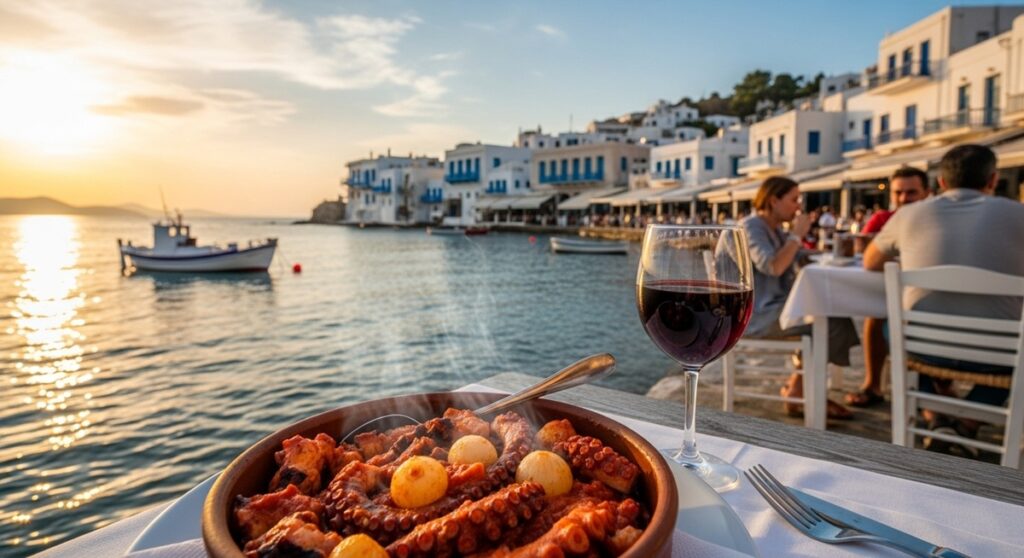
Beyond sightseeing, eat octopus stifado by the sea—essential as visiting the Acropolis. Pair with myth tours in Crete or wine tastings in Santorini for immersive experiences.
Aegean Seas in Every Bite
Octopus stifado is a myth retold through taste, uniting sea, gods, and people. From Cycladic tavernas to Cretan kitchens, it embodies Greece’s resilience and celebration.
To savor it is to dine with the gods and taste the soul of the Aegean Sea.







